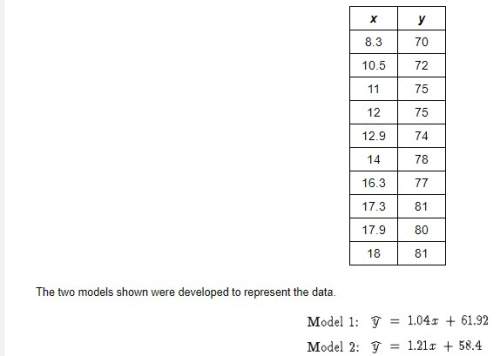
Mathematics, 08.02.2022 03:00 kayranicole1
Here is an equation that is true for all values of x: 5(x + 2) = 5x + 10. Elena
saw this equation and says she can tell 20(x + 2) + 31 = 4(5x + 10) + 31 is
also true for any value of x. How can she tell? Explain your reasoning.

Answers: 1


Another question on Mathematics

Mathematics, 21.06.2019 14:50
Which best describes the strength of the correlation, and what is true about the causation between the variables? it is a weak negative correlation, and it is not likely causal. it is a weak negative correlation, and it is likely causal. it is a strong negative correlation, and it is not likely causal. it is a strong negative correlation, and it is likely causal.
Answers: 1

Mathematics, 21.06.2019 19:30
Tim's phone service charges $26.39 plus an additional $0.21 for each text message sent per month. if tim's phone bill was $31.64, which equation could be used to find how many text messages, x, tim sent last month?
Answers: 1

Mathematics, 21.06.2019 21:50
(x-5)1/2+5=2 what is possible solution of this equation
Answers: 1

Mathematics, 22.06.2019 02:00
Asix-sided die of unknown bias is rolled 20 times, and the number 3 comes up 6 times. in the next three rounds (the die is rolled 20 times in each round), the number 3 comes up 6 times, 5 times, and 7 times. the experimental probability of rolling a 3 is 10 %, which is approximately % more than its theoretical probability. (round off your answers to the nearest integer.)
Answers: 1
You know the right answer?
Here is an equation that is true for all values of x: 5(x + 2) = 5x + 10. Elena
saw this equation...
Questions




Mathematics, 15.12.2020 21:10



Mathematics, 15.12.2020 21:10


Mathematics, 15.12.2020 21:10

Mathematics, 15.12.2020 21:10



Mathematics, 15.12.2020 21:10

Chemistry, 15.12.2020 21:10


Mathematics, 15.12.2020 21:10


Mathematics, 15.12.2020 21:10

Chemistry, 15.12.2020 21:10




